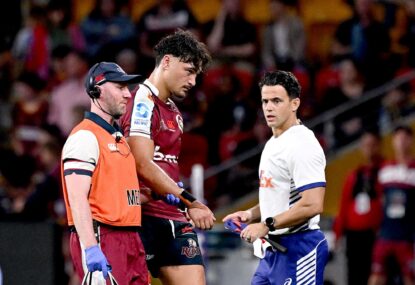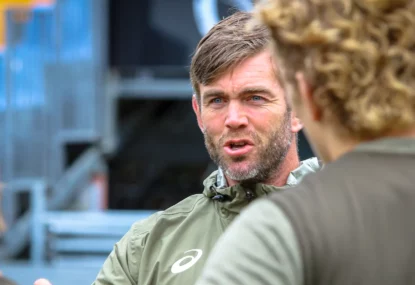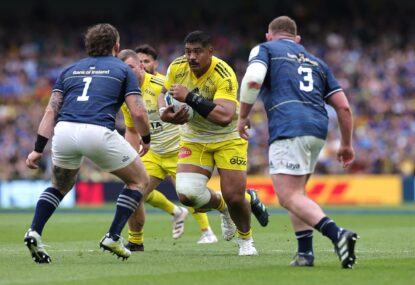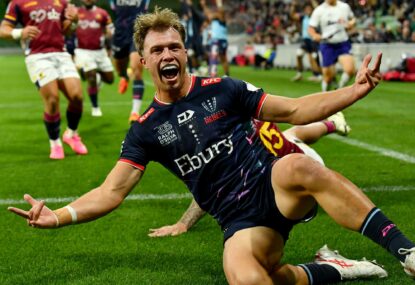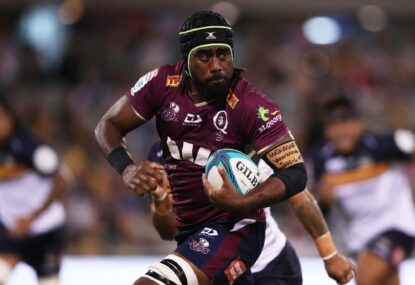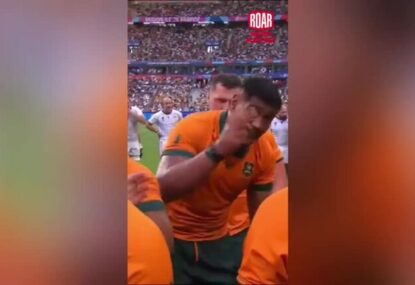Australian Super Rugby sides do not have good tactical kicking and their results indicate this is a consistent issue.
This has also been an issue for the Wallabies for some time.
When we compare our performances to the All Blacks, Wales, England and Ireland we can see there is a deficit. When Michael Lynagh was playing we had the best tactical kicker of a generation and one I would place first on an all-time list. Nothing lifts a tired forward pack than the ball going to the No. 10 and seeing it soar 50 metres downfield, to where the opposition fullback is not, tumbling into touch.
Nothing can relieve pressure better than this accuracy being applied consistently – well-placed grubber kicks, cross-field kicks that are as accurate as a torpedo pass. Future generations of rugby players and Wallabies should be made to watch Lynagh and past Wallabies to study their tactical kicking.
Australian Super Rugby needs a kicking academy to ensure all our sides have two consistently good tactical kickers on the field in every game. They must also be the No. 10 and No. 15.
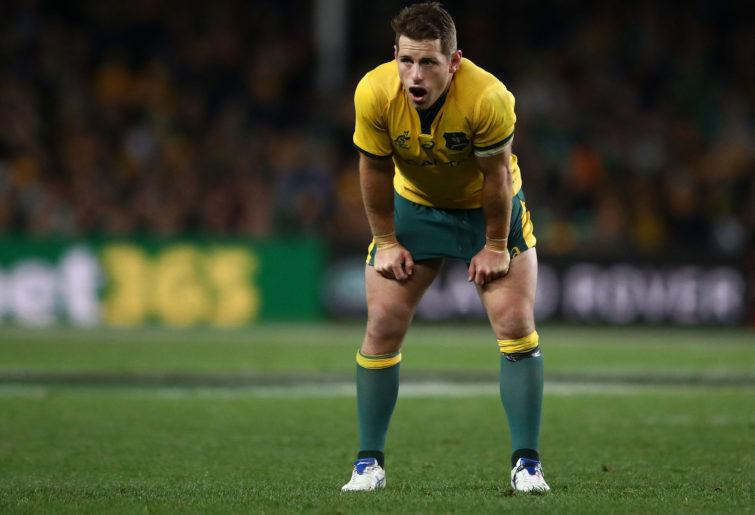
(Cameron Spencer/Getty Images)
“It’s not rocket science,” I know you’re thinking. But then why do we perform so badly in this area? We need an academy every year from now on in which four or more of our potential kickers from every Super Rugby team are taken for a week and coached by our best former players in the skill of tactical kicking.
We also need to bring back the scrum doctor, as Alec Evans once was. The Wallabies scrum has improved immeasurably since the sad days of regular collapses.
In terms of coaching, and it’s an issue Alan Jones has written about, our current first-string halfbacks are taking too long to recycle the ball and way too long to place the ball in the scrum. Unless it is a five-metre scrum, halfbacks should be instructed that their job is to get the ball into the scrum cleanly and quickly. It saps the energy out of the forward pack to hold up a scrum for inordinately long periods every scrum. In fact if I were in the front or second row, I would be having a word to the halfbacks and let them know what you expect.
The Wallabies have lost every game I can remember in which the scrumhalf has taken too long to place the ball in the scrum. It is a portent of the failure about to unravel.
Another area which has been less than ideal is close-quarter passing and catching. The All Blacks and top-performing squads have the best ball skills. This should also be a theme for Super Rugby coaches at every training session. Drills in passing and in catching terrible passes, as we see in the NRL, to be able to play top-flight rugby. Ball skills 101 must be drilled at every level.
One area in which the Wallabies have been very effective, especially considering injuries and the intensity of a campaign, is fitness and speed. We can never compete against the best without maintaining excellent flexibility, speed and endurance, which is also key in any elite sport.
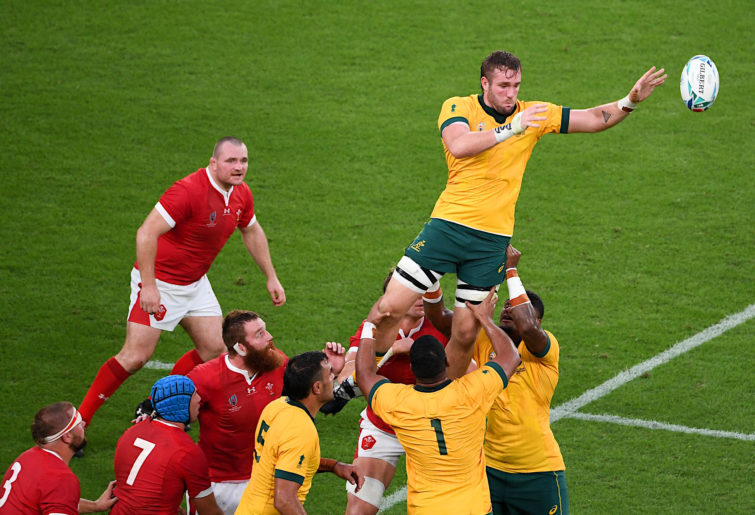
(William West/AFP/Getty Images)
The off-season is when fitness levels are improved and determine the level of fitness during a long season. The Wallabies and Super Rugby have extensive fitness programs in the out of season break. To be a contender for the Wallabies these programs need to be tailored to individual athletes to build up areas of weakness and possible injury.
Perhaps second rowers and the loose forwards should take up David Pocock’s training regime. The most dedicated personal fitness regime a Wallabies player has used to remain playing and injury-free.
There should be a tactical coaching group, including NRL professionals, to analyse opportunities in attack and defence specific to the opposition the Wallabies are about to encounter. Naturally this is done, but a panel featuring our best former players and coaches should be able to contribute in a forum to assist the coach and players in the Wallabies squad. Eddie Jones is one of the great markers of this. He does his homework and prepares his squad specifically to the next opponent.
Lastly, consistent with my first appraisal that Super Rugby and the Wallabies need tactical kickers, we must groom several accurate place kickers in every team. Accuracy for kickoffs, restarts, conversions and penalties. Wales, England and the All Blacks have specialist kickers who are generally much better than ours. This can be practised and taught.
Generally our national team cannot succeed unless our Super Rugby franchises are also teaching these key areas of the game. Generally the deficits in the Wallabies over the past few years have been identical to those in all our rugby franchises. To address this we need a coordinated and deliberate forum for Wallabies skill coaches to assist in formulating components of training for the Super Rugby off-season and in-season preparation.
It would also be an idea to have our best coaches and players provide videos for training schoolboy and women’s rugby in these basic skills, like New Zealand, to ensure these skills are drilled at all levels of rugby well before anyone pulls on the national guernsey.
The Wallabies have underperformed due to both tactical and skill-based deficiencies. I have not mentioned forwards training for scrums and lineouts, but without coordinated coaching our current proficiency in these areas will slip.
We need also coaching in recovering a high ball from Australian Rules football coaches and in sliding defence and changing the angle of attack from the NRL. When considering our tactical kicking, why haven’t the best Australian Rules football coaches and players been used to improve our efforts in this area?
What made the Wallabies world beaters in the past was a deliberate plan from our best coaching and former playing staff to improve the tiers below the national team, which is Super Rugby and regional rugby. When they are consistently competitive with New Zealand and South African teams our Wallabies will also be lifted.
We need new blood and new brains to carry the rejuvenation of the Wallabies forwards. After a dismal period and with TV audiences falling away, Australia should do what it must to bring Super Rugby live to free-to-air television. Nothing has killed our fan-base faster than pay-per-view broadcast rights. We also need new sponsors and a completely new board, John Eales excepted.
Now is the time for a complete cleanout and for CEO Raelene Castle to admit the Wallabies have consistently underperformed on her watch. It’s time to rebuild, rejuvenate and renew the management and governance of rugby union in Australia. Most blue-blooded fans are asking for changes that are more than just cosmetic.
Let me add my voice to this dissatisfaction with our recent performances, which are about coordinating training in areas which feed the Wallabies with talent. It is about returning to our roots and it is about ensuring high-quality rugby is able to be viewed regularly on free-to-air television.
I know many rugby fans feel much the same way about where we have been in the recent past, so if you have influence, please ensure the momentum is there for real changes to maintain our great sport.































































































